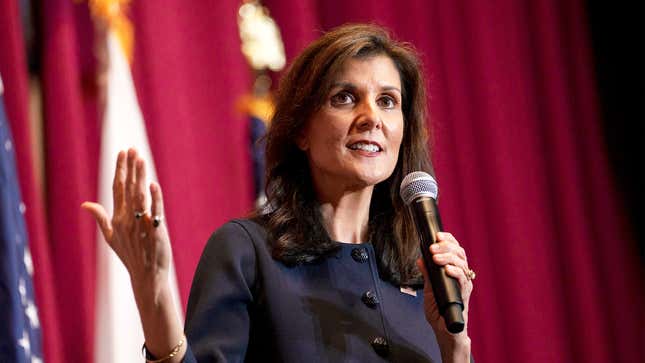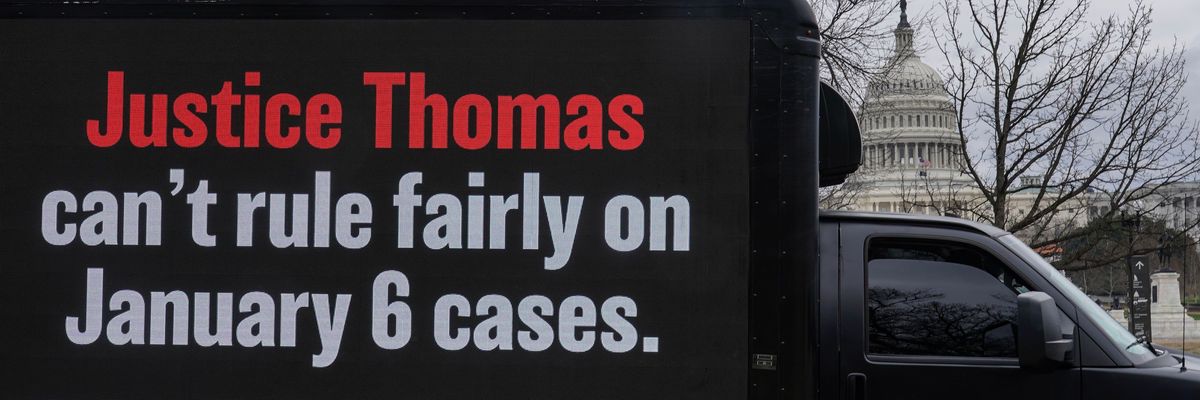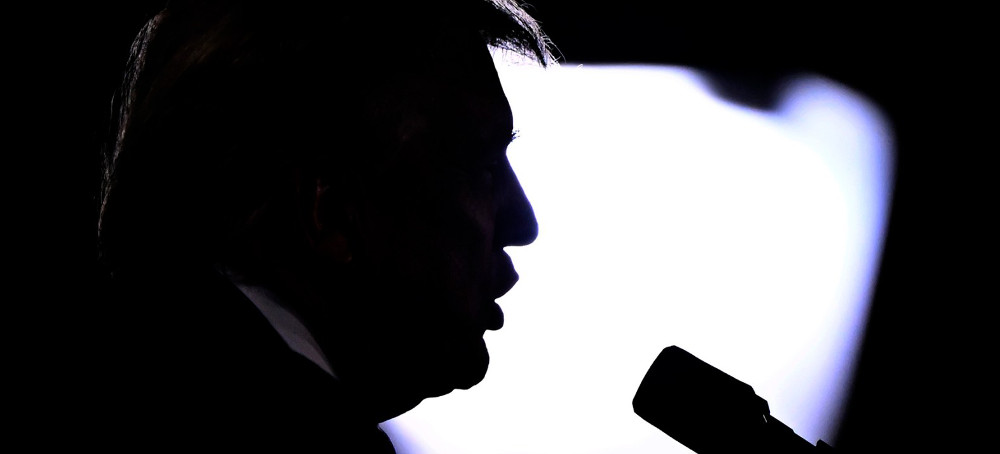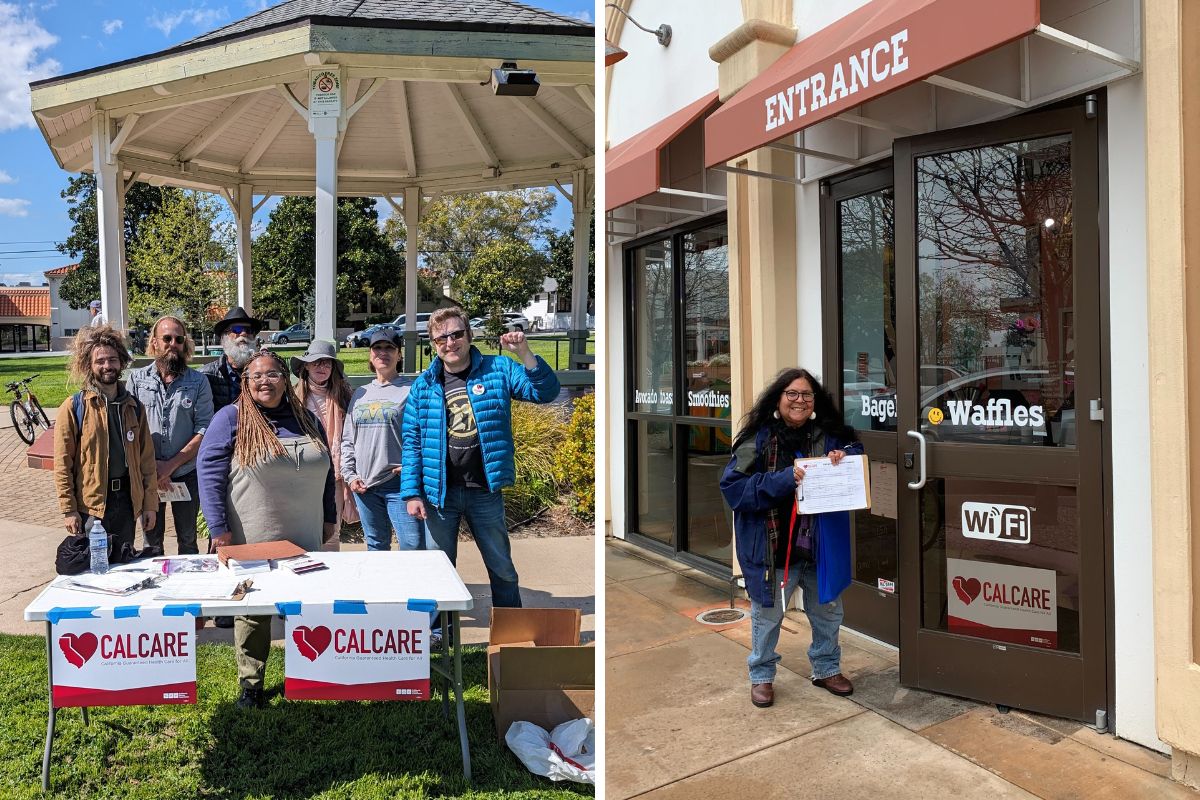Leave a comment
Donald Trump is a threat to America.
His loyalty to Putin also makes him a threat to world peace, as he just showed us by killing the Senate bill to secure the border and provide aid to Ukraine, Taiwan, Israel, and the Palestinians in Gaza.
And today the Supreme Court will have an ability to remove that threat by simply following the plain language of the US Constitution that says people who’ve engaged in insurrection or provided aid and comfort to same can’t hold public office.
Today’s arguments, ironically, will also be the second time the 14th Amendment has been invoked to try to change the outcome or the setup for an election. The first was Bush v Gore in 2000, and we know how that turned out.
So, what can we expect? Will the Court follow the law?
They certainly haven’t in the past, and it appears that, at the least, Clarence Thomas again has no intent of following the law and recusing himself even though his wife was personally involved in the insurrection. Nor will Roberts, Kavanaugh, or Coney Barrett, even though all three helped George W. Bush’s legal team argue his case before the Court in 2000 and were rewarded with their own seats on that body.
The last time the Supreme Court inserted itself into a presidential election was 2000, when multiple members of the Court had clear conflicts of interest that, like Thomas today, they chose to ignore to hand the election to George W. Bush, even though Al Gore won the election, both in the popular vote and the electoral college.
For the record, it’s important to remember that history, as it appears history may be about to repeat itself.
In the process of ratifying Bush’s election, five members of the unelected third branch of government made sure that its own majority character and nature probably wouldn’t change for a long enough time that the Court could cast a hugely conservative shadow over the American electoral process, guaranteeing that people like themselves and their patrons — wealthy, powerful, and corporate-connected — would continue to have a disproportionate impact on future elections.
Here’s how they did it and what their actions might tell us about how the insurrection case before the Court today might play out:
Sandra Day O’Connor (R)
Supreme Court Justice Sandra Day O’Connor was no stranger to Republican politics. She’d served three terms as a Republican state senator in Arizona, her last term as majority leader — the ultimate political insider’s job. Appointed to the U.S. Supreme Court in 1981 by President Ronald Reagan, nineteen years later she had decided she wanted out. The workload was intense, and her husband was starting to display some of the same early symptoms of Alzheimer’s that she had observed in Reagan during his second term as president. And she missed Arizona terribly.
So on the evening of November 7, 2000, when O’Connor and her husband were guests at an election-eve party watching the CBS election reporting, and Dan Rather came on to call Florida for Al Gore, making Gore president, she was horrified.
“This is terrible,” Newsweek reporters Evan Thomas and Michael Isikoff quote two different witnesses as saying she “exclaimed.” O’Connor was so troubled that she got up “with an obvious look of disgust” and left the room.
The puzzled guests turned to her husband, John O’Connor, who with the candor that often accompanies early dementia, explained that she wanted to retire to Arizona but wasn’t willing to do so if her successor would be appointed by a Democratic president.
On the first day of December, however, she would do something about her concern, voting to block the state of Florida from conducting a recount that had just been ordered by the Florida Supreme Court. That vote froze in place the “win” of George W. Bush, as the constitutional clock was running out on when the election had to be decided.
Clarence Thomas (R)
George H. W. Bush Court appointee Justice Clarence Thomas—as is usually the case—wasn’t in a public setting on election eve, but it’s not hard to guess his concern. His wife, Virginia, worked for the Heritage Foundation, a far-right think tank in Washington, D.C., as the director of executive branch relations. As such she was organizing resumes for loyal right-wingers who could become appointees to a Bush White House.
The week her husband’s Court accepted the Bush v. Gore case and before it was decided, she sent out e-mails soliciting potential appointments for the Bush administration.
The New York Times noted in a December 12, 2000, article (“Job of Thomas’ Wife Raises Conflict-of-interest Questions”):
“A federal appellate judge, Gilbert S. Merritt of the U.S. Court of Appeals for the Sixth Circuit, said he saw a serious conflict of interest for Justice Thomas in deciding a case that could throw the election to Governor Bush.
““The spouse has obviously got a substantial interest that could be affected by the outcome,’ he said in an interview from his home in Nashville. ‘You should disqualify yourself. I think he’d be subject to some kind of investigation in the Senate….’”
But he urged Justice Thomas to remove himself from the case in order to prevent any violation of a federal law — he cited Section 455 of Title 28 of the U.S. Code, “Disqualification of Justices, Judges or Magistrates” — that requires court officers to excuse themselves if a spouse has “an interest that could be substantially affected by the outcome of the proceeding.”[3]
And Thomas himself, as the former legislative assistant to Republican Senator John Danforth (who championed his appointment to the Supreme Court), was no stranger to Republican politics and, after a bruising confirmation hearing (Anita Hill), bore no goodwill for Democrats.
Antonin Scalia (R)
Reagan appointee Justice Antonin Scalia, on December 1, looked down from his leather chair in the Supreme Court chambers to see Ted Olson, a senior partner — the lawfirm equivalent of a senior executive or director — of the law firm Gibson, Dunn & Crutcher. As a senior partner at GD&C, Olson was among the management — the boss — of Scalia’s son Eugene Scalia, who was merely a partner in the firm.
Scalia chose not to mention his son’s association with Olson and didn’t recuse himself. Later he would famously and sarcastically tell a student at a law forum, of the Bush v. Gore ruling, “Get over it!”
William Rehnquist (R)
Nixon appointee William Rehnquist had made a name for himself in Arizona Republican politics in the 1960s, leading what a U.S. Senate investigation termed a “ballot security” effort to challenge the votes of American Indians and African Americans, who were more likely to vote Democratic. The Senate investigation further noted that Rehnquist, back in the day in Arizona, had “publicly opposed a Phoenix public accommodations ordinance, and he publicly challenged a plan to end school segregation in Phoenix…”
And by 2000, seventy-six years old and in unreliable health, Rehnquist had discussed with more than one friend his concern about retiring or even dying on the bench and who would replace him.
Anthony Kennedy (R)
Reagan appointee Anthony Kennedy had been a close friend of Ronald Reagan, helping draft for him tax cuts when Reagan was governor of California, and got his appointment to the federal bench on Reagan’s suggestion to then-president Gerald Ford. Reagan then appointed him to the Supreme Court after first trying unsuccessfully (this was back in the days when Democrats would say no to a Republican president) to put Robert Bork and Douglas Ginsburg in that slot.
An affable man, Kennedy was far more follower than leader: during the years Rehnquist was alive and Kennedy was on the bench (1992 to 2005), Kennedy voted identically with Rehnquist 92 percent of the time, more than any other justice.
The Future of the Court
In the Bush v. Gore case, these five Republican justices were faced with the opportunity to shape the very Court itself for the next generation. They, and they alone, had the power to make sure that a Republican, regardless of their personal opinions of George W. Bush, would appoint at least one and possibly more justices, thus keeping the majority of the Court on their side.
Al Gore had won the presidency by 543,895 votes nationally; no candidate in the history of the republic had ever had such a large popular vote win and lost the White House. He also, it turned out, had won the vote in Florida. (Although his initial legal strategy of only recounting three counties wouldn’t have proven it; it took a recount of the entire state.)
President Gore?
Almost a year after the election, a consortium of news organizations actually physically counted all the Florida ballots, as the Florida Supreme Court had ordered. What they found—just a few weeks after the 9/11 attacks—so horrified them that they chose to report the story in an intentionally confusing way so as not to diminish President Bush’s authority during a time of crisis.
The New York Times, on November 12, 2001, published the results of the statewide recount that, it said, “could have produced enough votes to tilt the election his [Gore’s] way, no matter what standard was chosen to judge voter intent.” [Italics added.]
The Times article went on to document how Al Gore won Florida in 2000:
“If all the ballots had been reviewed under any of seven single standards [all the ones that were used by either party], and combined with the results of an examination of overvotes, Mr. Gore would have won, by a very narrow margin. For example, using the most permissive “dimpled chad” standard, nearly 25,000 additional votes would have been reaped, yielding 644 net new votes for Mr. Gore and giving him a 107-vote victory margin….
“Using the most restrictive standard — the fully punched ballot card — 5,252 new votes would have been added to the Florida total, producing a net gain of 652 votes for Mr. Gore, and a 115-vote victory margin.
“All the other combinations likewise produced additional votes for Mr. Gore, giving him a slight margin over Mr. Bush, when at least two of the three coders agreed.”
And yet all of this information was buried well after the seventeenth paragraph of the story, which carried the baffling headline “Study of Disputed Florida Ballots Finds Justices Did Not Cast the Deciding Vote.”
The Times analysis further showed that had “spoiled” ballots — ballots normally punched but “spoiled” because the voter also wrote onto the ballot the name of the candidate — been counted, the results were even more spectacular.
While 35,176 voters wrote in Bush’s name after punching the hole for him, 80,775 wrote in Gore’s name while punching the hole for Gore. Katherine Harris decided that these were “spoiled” ballots because they were both punched and written upon and ordered that none of them should be counted.
Many were from African American districts, where older and often broken machines were distributed, causing voters to write onto their ballots so their intent would be unambiguous.
The New York Times added this information in a sidebar article with a self-explanatory title by Ford Fessenden: “Ballots Cast by Blacks and Older Voters Were Tossed in Far Greater Numbers.”
Although it took a year for these findings to become public, even at the time of the election reports were leaking into Washington, D.C. — and thus to the five Republican appointees on the Court — that there were huge irregularities in Florida.
The Florida secretary of state, Katherine Harris, was also in charge of the Bush campaign in that state, and African-American groups like the NAACP were protesting that as many as eighty thousand Blacks had been purged from the voter rolls because a Republican-affiliated Texas corporation Harris had hired to “clean” the Florida list found that those Florida residents had names “similar” to the names of Texas felons.
Absentee ballots were also problematic: those from Americans overseas tend to swing Democratic, whereas military ballots tend to swing Republican. As the New York Times noted a year later, when the ballots had finally been opened and counted:
“A statistical analysis conducted for The Times determined that if all counties had followed state law in reviewing the absentee ballots, Mr. Gore would have picked up as many as 290 additional votes, enough to tip the election in Mr. Gore’s favor in some of the situations studied in the statewide ballot review.”
The Court Acts
On November 17, 2000, the Florida Supreme Court blocked Katherine Harris from certifying the election. On November 21 it ruled that all the ballots in the entire state must be recounted (which, we now know, would have led to an indisputable Gore win).
The Bush campaign brought in hired gun James Baker and attorney Ted Olson to take over. Congressman Tom DeLay, aka “The Hammer,” flew nearly his entire congressional staff (along with a few others) down to Florida to stage a mob-like stunt, coordinated with Roger Stone, posing as Floridians and banging on windows where votes were being counted, shouting “Stop the count!”
Republicans organized protesters to stand, 24/7, around the Gore’s Washington, D.C., home (the Naval Observatory is what it’s called), shouting through bullhorns throughout the night, “Get out of Dick Cheney’s house!” Gore later recounted to me how terrified his children were by the ongoing and angry display.
Baker and Olson turned to Rehnquist’s former clerk, a millionaire Washington, D.C., corporate attorney named John Roberts, to come down to Florida to plan strategy with them to take a case to the Supreme Court that would stop the statewide recount. Roberts, who had become a friend of Rehnquist as well as his clerk, had argued many times before the Rehnquist Court and had an impressive record of wins.
As Miami Herald reporter Marc Caputo documented in an article for that paper (“Roberts Had Larger 2000 Recount Role”), Roberts “was a member of a tight-knit circle of former clerks for the court’s chief justice, William Rehnquist — a group jokingly referred to as ‘the cabal.’” Roberts also helped run a “dress rehearsal to prepare the Bush legal team for the U.S. Supreme Court,” as well as meeting with the candidate’s brother, Florida Governor Jeb Bush.
Prepped by Roberts, Olson and his team flew to Washington, D.C., and argued that, among other things, because the Fourteenth Amendment demands equal protection under the law, and different Florida counties used different voting systems and different criteria for determining the intent of the voter, the state was in violation of the Fourteenth Amendment.
It was just what the Republican Five on the Supreme Court needed. Although logically if they were to rule that this was true, it would mean that every state in the union was in violation of the Constitution and that national standards would have to be immediately implemented, they used the argument nonetheless, but said that it counted only for this one case, only in Florida for the 2000 presidential election, and did not constitute a precedent.
To put icing on the cake, the Republican Five on the Court ruled that they had to rule because if they didn’t stop the count of the vote in Florida, it would result in “irreparable harm” to the man bringing the lawsuit, George W. Bush.
Stevens Dissents
The four minority justices on the Court were incensed. Justice John P. Stevens (with Ruth Bader Ginsburg and Stephen Breyer joining) wrote in his dissent of Bush v. Gore:
“When questions arise about the meaning of state laws, including election laws, it is our settled practice to accept the opinions of the highest courts of the States as providing the final answers.” Although there may be “rare occasions” where the Supreme Court should intervene, “This is not such an occasion.” [12]
Stevens wrote that the Court had no business inserting itself into Florida’s election:
“The federal questions that ultimately emerged in this case are not substantial.”
He went on to quote several previous cases where the Court had left state voting problems to the states, as provided for by Article II of the Constitution:
“Lest there be any doubt, we stated over 100 years ago in McPherson v. Blacker that ‘what is forbidden or required to be done by a State’ in the Article II context ‘is forbidden or required of the legislative power under state constitutions as they exist.’ In the same vein, we also observed that ‘the [State’s] legislative power is the supreme authority except as limited by the constitution of the State.’”
Stevens added that the only basis on which it would be reasonable for the Rehnquist Court to accept Bush’s lawsuit against Al Gore’s campaign was if the Florida Supreme Court’s justices — who had already ruled on the case — were totally corrupt. In fact, Stevens said, by overturning the Florida Court’s decision, the Supreme Court was nakedly suggesting that:
“The endorsement of that position by the majority of this Court can only lend credence to the most cynical appraisal of the work of judges throughout the land. It is confidence in the men and women who administer the judicial system that is the true backbone of the rule of law. Time will one day heal the wound to that confidence that will be inflicted by today’s decision. One thing, however, is certain.
“Although we may never know with complete certainty the identity of the winner of this year’s Presidential election, the identity of the loser is perfectly clear. It is the Nation’s confidence in the judge as an impartial guardian of the rule of law.
Ginsburg Dissents
Justice Ruth Bader Ginsburg’s dissent was even more scathing than that of Justice Stevens, particularly with regard to the Fourteenth Amendment.
“I agree with JUSTICE STEVENS that petitioners have not presented a substantial equal protection claim,” she wrote; she then endorsed the Florida Supreme Court’s decision to recount the vote. She concluded her dissent by saying, “In sum, the Court’s conclusion that a constitutionally adequate recount is impractical is a prophecy the Court’s own judgment will not allow to be tested. Such an untested prophecy should not decide the Presidency of the United States.”
Breyer Dissents
The dissent of Justice Breyer (which even David Souter joined, along with Ginsburg and Stevens) was perhaps the most direct and eloquent. It started in the first paragraph by stating:
“The Court was wrong to take this case. It was wrong to grant a stay. It should now vacate that stay and permit the Florida Supreme Court to decide whether the recount should resume.”
He went on to ridicule the Fourteenth Amendment arguments, noting that “the majority raises three Equal Protection problems,” which he then describes and knocks down, saying, “there is no justification for the majority’s remedy, which is simply to reverse the lower court and halt the recount entirely.”
Justice Breyer continued to bluntly say out loud that this was a political, and not a legal, decision:
“By halting the manual recount, and thus ensuring that the uncounted legal votes will not be counted under any standard, this Court crafts a remedy out of proportion to the asserted harm. And that remedy harms the very fairness interests the Court is attempting to protect….
“Despite the reminder that this case involves ‘an election for the President of the United States,’ no preeminent legal concern, or practical concern related to legal questions, required this Court to hear this case, let alone to issue a stay that stopped Florida’s recount process in its tracks.”
He hits home this point, saying that if there is to be a debate about who won the presidency (as there was in 1876), that debate should be resolved by Congress (as it was in 1876, later ratified in law by Congress in 1886). The Court, Breyer notes, echoing Jefferson, is the unelected of the three branches of government and as such should stay as far away from politics as possible:
“The decision by both the Constitution’s Framers and the 1886 Congress to minimize this Court’s role in resolving close federal presidential elections is as wise as it is clear. However awkward or difficult it may be for Congress to resolve difficult electoral disputes, Congress, being a political body, expresses the people’s will far more accurately than does an unelected Court. And the people’s will is what elections are about.”
This is about an election, not the Constitution, said Breyer. As such, for the Court to involve itself would bring disrepute on it and cause the public to lose confidence in it, thus wounding both the Court and the nation itself:
“At the same time, as I have said, the Court is not acting to vindicate a fundamental constitutional principle, such as the need to protect a basic human liberty. No other strong reason to act is present. Congressional statutes tend to obviate the need. And, above all, in this highly politicized matter, the appearance of a split decision runs the risk of undermining the public’s confidence in the Court itself.
“That confidence is a public treasure. It has been built slowly over many years, some of which were marked by a Civil War and the tragedy of segregation. It is a vitally necessary ingredient of any successful effort to protect basic liberty and, indeed, the rule of law itself.
“We run no risk of returning to the days when a President (responding to this Court’s efforts to protect the Cherokee Indians) might have said, ‘John Marshall has made his decision; now let him enforce it!’ But we do risk a self-inflicted wound — a wound that may harm not just the Court, but the Nation.”
The Court Gets What It Wants
But the majority decided, in large part using the unequal protection argument.
In the first application for the stay, Bush’s lawyers had argued that if the statewide vote count continued in Florida, the petitioners — the people bringing the lawsuit (Bush and Cheney) — would suffer “irreparable harm.” Justice Scalia, probably considering the future makeup of his own Court, agreed:
“The counting of votes that are of questionable legality,” Scalia wrote, “does in my view threaten irreparable harm to petitioner [Bush], and to the country, by casting a cloud upon what he claims to be the legitimacy of his election.”
Apparently, for the guy who’d won the most votes, Al Gore, being frozen out of an election that he’d actually won, did not, in Scalia’s world, constitute an “irreparable harm” that was the consequence of “unequal protection” by the highest court in the land.
By freezing the Florida recount, the Rehnquist Court handed the election to a Republican president, who would go on to replace both O’Connor and Rehnquist with corporate-friendly conservative stalwarts. Roberts’s reward was particularly spectacular — the man he helped make president, George W. Bush, would eventually appoint him chief justice of the Supreme Court.
So, how will this play out with regard to the 2024 election?
It’s hard to imagine that the Court will actually follow the law here, rather than simply looking for a technicality they can use to avoid directly confronting — and earning the wrath of — Donald Trump.
James Romoser, over at Politico, suggest there are three reasons why the Court may kick Trump off the ballot:
— Their reputation is in the tank and this is a chance to rehabilitate it.
— Removing Trump from the ballot will increase the perceived power and legitimacy of the Court.
— The Republicans on the Court (except Thomas) represent the old-fashioned GOP rather than the MAGA wing, and would like their party to return to normalcy.
Odds are, however, this decision will be as political and corrupt as the 2000 Bush v Gore was.
But I’m more than willing to be surprised.


























 Former President Donald Trump. (photo: Getty)
Former President Donald Trump. (photo: Getty)




